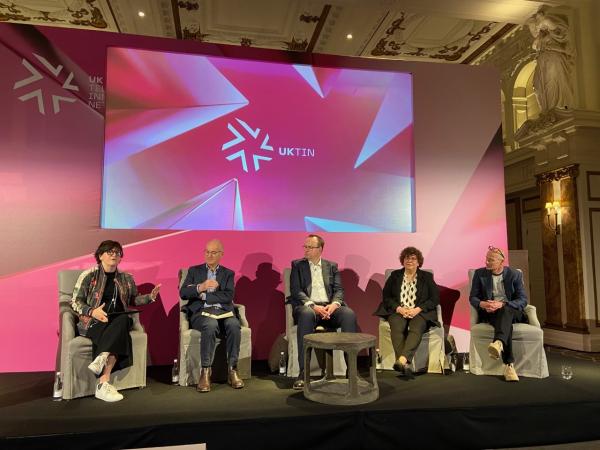
Up to 1,000 citizens across the West Midlands will benefit from improved social care provision, thanks to a groundbreaking collaboration between Coventry, Birmingham and Wolverhampton Local Authorities’ Adult Social Care Teams.
The programme is funded by the Department for Science, Innovation and Technology (DSIT) under the 5G Innovation Region scheme and will see Technology Enabled Care (TEC) - such as sensor devices and voice activated wireless technologies - installed in residents’ homes. The aim is to support more, vulnerable adults across the region to live more independently while reducing pressures on overstretched social care teams.
Recent connectivity advances have driven the development of a new generation of TEC solutions that go far beyond the reactive, passive approach of traditional telecare solutions. Instead, these new technologies proactively predict health support needs: Monitoring activity patterns; alerting care providers if something seems amiss; providing medication reminders; and reducing hospital admissions through effective sensor data
analysis. Each case is bespoke.
Case study
Kelly (not her real name), a 30-year-old resident with learning difficulties, bipolar disorder and lymphedema, faced losing her independence when her supported-living accommodation closed. She transitioned to a new supported-living environment, regaining autonomy and control over her life through a tailored package of technology. The technology solutions implemented included a falls sensor watch, motion sensors, a touchscreen smart speaker, door and window alarms, and a smoke detector, enhancing her safety and security. This reduced reliance on waking night staff resulted in significant care cost savings for the council, while the innovative technology fostered her personal growth and confidence, enabling her to embrace independent living.
Local authorities across England spent more than £28.4 billion on adult social care in 2022/3, with around half this figure going towards services for people aged over 65. In Birmingham alone, over 22,500 new adult social care requests for this age group were received during the period, with a further 14,410 support requests for younger adults, highlighting the scale of the challenge local authorities face up and down the country.
Minister of State for Data Protection and Telecoms, Sir Chris Bryant MP, said: “It’s fantastic to see cities like Coventry, Birmingham, and Wolverhampton being at the forefront of innovation, and – thanks to this government-backed project – being able to harness the power of tech to deliver more personalised services to those who need them most. From providing medication reminders to monitoring heart activity, cutting-edge technology can
truly support the health and care of the most vulnerable.”
Richard Parker, Mayor of the West Midlands, said: “Our councils run such a valuable service with social care, working tirelessly to take care of some of the most vulnerable people in our communities.
“But it is a service under huge pressure. We need to do everything we can do ease this pressure while supporting people to stay in the homes they love, and to live independently, for longer.
“Innovative solutions are what we need which is why I am proud to showcase the work we are carrying out in the West Midlands. Our councils are leading the way, using technology to improve care and support in a way that’s setting a new standard for the region and the nation.”
Robert Franks, MD of WM5G, which is delivering the 5GIR Health and Care programme on behalf of the West Midlands Combined Authority (WMCA), said: “Our ageing population, combined with growing numbers of adults managing complex health needs, is putting social care services under ever-greater strain. Individual councils are already spending hundreds of millions of pounds each year to support these residents and, despite this, half of over 65s are likely to spend up to £20,000 on care costs over their lifetimes, with one in seven facing bills of more than £100,000.
“Technology Enabled Care - such as sensors, monitors and voice-activated systems - offers potential to revolutionise the delivery of social care across the country, helping vulnerable older adults stay in their homes safely for longer, and empowering younger adults with specialist care needs to live more-fulfilling, independent lives.
“Crucially, TEC can also reduce pressure on our stretched social care teams, reducing the number of face-to-face visits required, for example when supervising residents taking medications. This releases capacity from within the system, freeing social care practitioners to focus on other areas of demand and empowering them with the data they need to proactively identify needs and evolve care packages to suit individual requirements.”
A digital revolution for care
As part of a wider ‘care community’ that comprises citizens in receipt of social care, their families, councils and delivery partners, TEC will enable people to live more independently, staying in their homes for longer and significantly enhancing their quality of life.
The 5GIR Health & Care programme includes delivery of specialist training for care providers; work to build an evidence base for the economic and wider benefits of the approach; evaluation of different TEC offerings; and the development of blueprints for wider-scale adoption - in line with the NHS’s Strategic Shifts.
The programme will be delivered by local authority social care teams alongside technology partners Alcove and Rethink Partners.
Jess Ellis, 5GIR Programme Director, WM5G said, “By leveraging advanced technologies, WM5G, Alcove, Rethink Partners, and our local authority partners are committed to creating a sustainable, efficient, and supportive care environment for the region’s citizens.
“This effort not only aligns with Peter Kyle’s vision of transforming public services through digital innovation but is also intrinsically linked to Wes Streeting's three big shifts for the NHS: Moving care closer to home; focusing opreventative care; and leveraging technology to transform services, ensuring a future-ready healthcare system.”
Diane, a Wolverhampton resident with lived experience, said: “Having this technology installed in my home has been a true blessing. It makes me feel so much safer, knowing that help is just a button press away if I ever need it. I feel more independent than ever because I can go about my day without constantly worrying and also knowing my family feel so assured by this support really empowers me. It gives me peace of mind, and that is truly priceless.”
Louise Ferro (Coventry), Julie Harrison (Birmingham), and Suzanne Cash
(Wolverhampton), local authority commissioning managers, said: "TechnologyEnabled Care (TEC) is ground-breaking as it provides real-time data that supports and potentially reduces crisis management for our citizens. By offering timely information, TEC delivers much-needed assurance to unpaid carers, ensuring their loved ones are safe and well. This reduces the risk of carer breakdown and allows carers to manage their responsibilities more effectively.”









